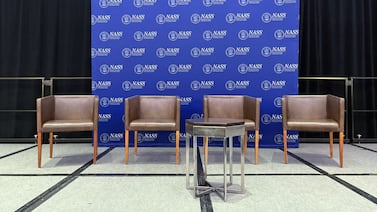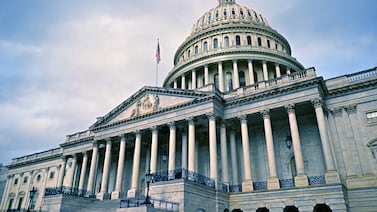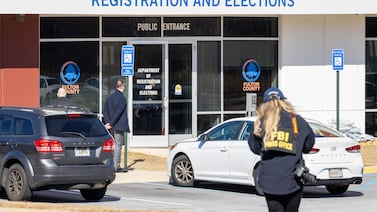A version of this post was originally distributed in Votebeat’s weekly newsletter. Sign up here.
We’re out this week with a piece from Rachel Leingang, our Arizona freelancer, on cast vote records and the requests to see them, which are besieging election officials across the country.. If you are a clerk reading this and you haven’t gotten such a request, I want to hear from you. You’ll be the first one I’ve found.
Rachel’s reporting makes abundantly clear a fact election officials probably already knew: The CVR can’t actually tell a layperson much, and it certainly can’t help these activists ensure that votes were counted accurately. And by pelting election offices with these requests, the activists are — contrary to their stated goals — making elections less secure across the board.
How so? Processing these massive records requests, and explaining the records, takes time and resources from election offices — famously short-staffed and under-resourced — right at the time they are preparing to conduct the midterm elections. Dedicating time to responding to fishing expeditions means they have fewer resources dedicated to being careful. How could it not?
Plus, keep in mind that the cast vote records are just the flavor of the moment. These activists have been piling on an unprecedented number of complex records requests essentially since the 2020 election, and it’s only ramping up. Why? They’re searching endlessly for ways to prove the 2020 election was tainted by fraud, even though, nearly two years later, there’s still no evidence of anything that could have affected the election results.
The requests are often cut-and-paste jobs. The language has been lifted from, as Rachel writes, “people known for promoting baseless theories about election fraud.” For example, Mike Lindell. I’m sure you’ve heard of him. He sells pillows. And also conspiracy theories.
In late August at an event, he reinforced the need for participants and listeners to send in such requests. Colorado saw dozens of them. Arizona did too. So did Texas. So did, it seems, everyone.
“The remarkable thing is that there’s really a lot less here than it might seem in both directions. It’s way less ominous than it could be, but it’s also way less useful,” said Max Hailperin, a retired computer science professor who has researched election technology. “I suspect many of the people that are requesting them don’t know what any of it is. They’re just the mules, to borrow that term.”
So, what’s a cast vote record, anyway? Folks: We have a moving graphic that will show you. Take a look, but the upshot is this, from Rachel: “The records can be a useful tool for researchers and auditors. They can find larger trends, like how many people split their ticket, how precincts moved toward a given party over time, or how the method of voting (mail vs. in person) changes. When combined with ballot images, the cast vote record can provide a way to audit an election, though the paper ballots would be a better tool.”
But they can’t do what the activists who want them think they can do, and CVRs are different across the country. Some have ballot images, some don’t. Some jurisdictions don’t keep CVRs at all, given their voting system. And in the meantime, elections offices are coping with copy-and-paste requests.
Connecticut, for example, uses tabulators that don’t record cast vote files. And while Gabe Rosenberg, the chief of staff and counsel for the secretary of state, says he doesn’t believe activists are submitting the requests maliciously, that might not be the case for those who wrote the initial language. “Part of the benefit for them is that it takes up the entire day,” he told Rachel.
Are these requests taking up your entire day? Are requestors sending in identical requests for information you don’t have or will consume your staff’s resources to complete? Tell us.
Back Then
It’s tempting to be so overwhelmed by our present moment that we forget that conspiracy theorists have been making life difficult for election officials for decades. Consider the year 1998, when Rep. Bob Dornan of California (who the Washington Post dubbed “the enfant terrible of the House Republican caucus”) insisted his loss to Democrat Lorena Sanchez in 1996 had been marred by fraudulent votes cast by noncitizens. His accusations were routinely racist, though he denied such motivation. “I never had a fixation on Hispanics when I talked about voter fraud, but the Democrats were very clever in playing the race card, and my own party, I’m sorry to say, let me down,” the nine-term former congressman told the Post that year. “So, I’ve got a real problem here.”
He lost again in 1998, and Sanchez remained in office until 2017, when she elected to run instead for the Senate and lost. Contemporaneous investigations into Dornan’s allegations found a few noncitizen votes, but not enough to call the result into question. Time, it appears, is a flat circle.
In Other Voting News
- A New York Times review of roughly 400 voting-fraud charges around the country filed since 2017 found the number of people charged to be “infinitesimal,” many of those charged didn’t realize they were breaking the law, and penalties were inconsistent. Poor and Black people charged in such cases were more likely to be sent to jail.
- At a training for poll workers and election observers before Michigan’s primary last month, Wayne County Republican officials encouraged trainees to break the rules by secretly bringing pens and paper and cell phones into polling places and vote-counting centers, CNN reports.
- Surveillance shows that technology consultants attempting to find proof of fraud in the 2020 presidential election repeatedly visited the election offices in Coffee County, Georgia, in the weeks after election equipment there was reportedly breached, the Washington Post reports. The matter is the subject of an ongoing criminal investigation.
- Michigan authorities are investigating how a Wexford County voting machine sold for $1,200 on eBay wound up for sale online. The buyer? Election security expert Harri Hursti, who alerted the secretary of state’s office to make sure the transaction was legitimate.
- In the wake of a federal judge’s ruling that the South Dakota secretary of state’s office had violated the National Voter Registration Act by not making it easier to vote and, in the case of some state agencies, making errors. The secretary of state’s office will create an NVRA coordinator to ensure the law is followed in order to settle the lawsuit brought by the Rosebud Sioux Tribe, the Argus Leader reports.
- A Wisconsin judge ruled that the state elections commission wrongfully issued guidance allowing local officials to fix errors on witness certificates for absentee ballots, like filling in missing ZIP codes. The judge sided with Waukesha County Republicans, who said state law did not permit the practice.
- A special prosecutor will weigh whether to bring charges against several individuals in Michigan, including Matthew DePerno, the GOP nominee for state attorney general, who allegedly were involved in a conspiracy to gain improper access to voting machines in the state, the Detroit News reported.
Jessica Huseman is Votebeat’s editorial director and is based in Dallas. Contact Jessica at jhuseman@votebeat.org.






